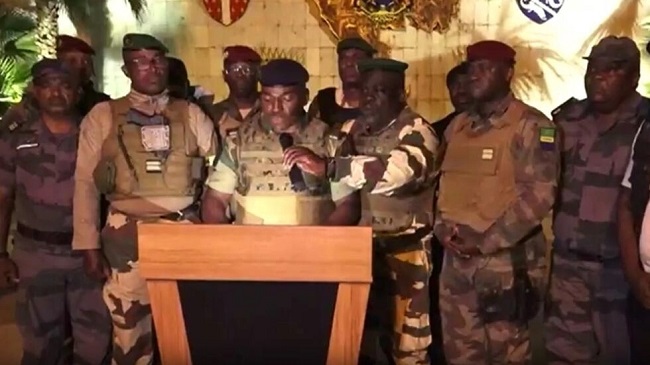Pointless talking shop: African Union suspends Gabon after military coup
The African Union’s Peace and Security Council said Thursday it had decided to “immediately suspend” Gabon following a coup that ousted President Ali Bongo. The decision came as the junta that took power announced it would respect Gabon’s commitments at home and abroad in a bid to reassure the international community.
The African Union Commission’s Political Affairs, Peace and Security Department “strongly condemns the military takeover of power” in Gabon and “decides to immediately suspend the participation of Gabon in all activities of the AU, its organs and institutions … until the restoration of constitutional order in the country,” said the AU in a post on X, formerly Twitter.
The announcement followed an AU Peace and Security Council meeting on Thursday to discuss the situation in Gabon.
The meeting was chaired by the AU commissioner for political affairs, Bankole Adeoye of Nigeria, and the current holder of the council’s rotating chair, Willy Nyamitwe of Burundi.
The decision came hours after Gabon’s military junta said the general who led the overthrow of the Bongo dynasty, Brice Oligui Nguema, would be sworn in on Monday as the country’s transitional president.
General Nguema’s swearing-in would take place at the constitutional court, the army announced on state TV.
The junta also said it would “respect all commitments” at home and abroad and “phase in transitional institutions”, Colonel Ulrich Manfoumbi Manfoumbi, spokesman for Gabon’s newly formed Committee for the Transition and Restoration of Institutions (CTRI), said on state TV on Thursday, a day after rebel officers ousted Bongo.
The country’s coup chief Nguema “wishes to reassure all donors, development partners and the state’s creditors that all measures will be taken to guarantee that our country’s commitments, both external and internal, will be respected”, said Manfoumbi.
Wednesday’s coup came shortly after Gabon’s election commission announced the results of the August 26 presidential contest giving the incumbent Bongo 64 percent of the vote and another term in office.
A day later, Gabon’s main opposition alliance urged military officers who seized power to continue the election process and finish counting the presidential vote, which it said was falsely awarded to Bongo before the count was completed.
The opposition Alternance 2023 alliance had been silent after the coup but on Thursday “invited the defence and security forces to the discussion so as to work out … the best solution” following the vote.
Led by university professor Albert Ondo Ossa, Alternance had earlier accused Bongo of “fraud” and demanded he hand over power “without bloodshed”.
‘Contagion of autocracy’
On Wednesday, the head of the African Union Commission, Moussa Faki Mahamat, said he “strongly condemns” what he described as an attempted coup in oil-rich Gabon.
Faki had also called on the Gabonese army and security forces “to guarantee the physical integrity” of Bongo, whom the coup leaders said had been placed under house arrest.
The military takeover ends more than half a century of the Bongo family’s rule and creates a new conundrum for a continent that has struggled to deal with eight coups since 2020. Nigeria’s recently elected president called it a “contagion of autocracy”.
Central Africa’s political bloc, the Economic Community of Central African States (ECCAS), condemned the coup in a statement, saying it planned an “imminent” meeting of heads of state to determine how to respond. It did not give a date.
Five other countries in Africa – Mali, Guinea (Conakry), Sudan, Burkina Faso and Niger – have experienced military coups in the last three years, with their new rulers resisting demands for a short timetable for returning to their barracks.
Bongo’s fate remains unclear but the CTRI, which includes the heads of all army corps in Gabon, said he had been “placed in retirement”.
International condemnations have followed Gabon’s coup, but they have been more nuanced than those that followed other recent military takeovers.
France, Gabon’s former colonial power, condemned the coup and renewed calls “to see the results of the election respected, once they are known”.
Other reactions focused on the credibility of the vote itself.
“Naturally, military coups are not the solution, but we must not forget that in Gabon there had been elections full of irregularities,” said the European Union’s foreign policy chief, Josep Borrell.
A rigged vote could amount to a civilian “institutional coup”, he said.
The US State Department said it was “strongly opposed to military seizures” but voiced concerns over the “lack of transparency and reports of irregularities surrounding the election”.
The elections were held without international observers, and foreign journalists had been largely restricted from covering the event, according to the media watchdog Reporters Without Borders (RSF).
Source: AFP




